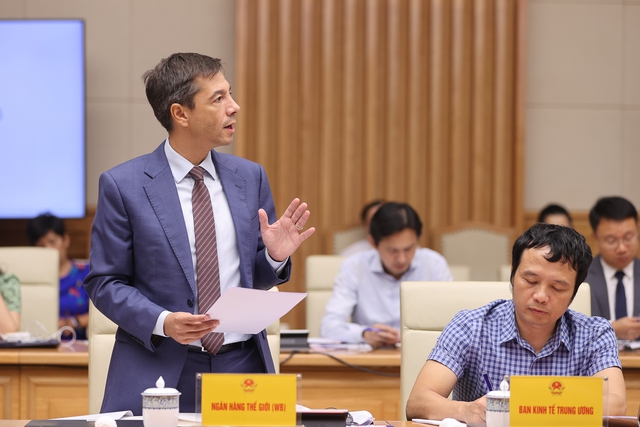WB Lead Country Economist: Viet Nam sees strong rebound, momentum remains strong
VGP - Viet Nam has witnessed a strong rebound after last year’s COVID related slowdown, said World Bank (WB) Lead Country Economist and Program Leader for Equitable Growth, Finance and Institutions in Viet Nam Andrea Coppola.

World Bank (WB) Lead Country Economist and Program Leader for Equitable Growth, Finance and Institutions in Viet Nam Andrea Coppola - Photo: VGP
In a recent meeting held this week, Andrea Coppola said that the second quarter surprised on the upside and momentum remains strong.
Industrial production registered 2.9 percent growth in August, driven by food and beverages, footwear and machinery subsectors.
However, looking ahead some headwinds are brewing. Lower global growth is expected to weigh on industrial production and exports which have been major drivers of the recovery while persistent COVID-19 related disruptions may affect domestic recovery especially in the service sector.
Inflation decreased in August as a result of softening fuel prices. On the other hand, core inflation has been accelerating since the beginning of the conflict in Ukraine and will need to be closely monitored.
Nevertheless, there are risks that persistent price increases could cause inflation expectations to rise and feed into destabilizing pressures on nominal wages and production costs.
From the demand side, stronger domestic demand and the continued recovery of consumption could also further compound price pressures.
Recommendations
According to Andrea Coppola, the current situation confronts Viet Nam's policymakers with the difficult task of balancing the need to provide continued policy support to solidify the recovery with the need to contain emerging inflation and financial risks.
High uncertainty will require the policy mix to be adapted to changing circumstances, he added.
First, a more supportive fiscal policy stance could hedge against downside risks to growth, recommended the WB specialist, adding that addressing the under-execution of the public investment program would make fiscal policies more effective.
In the short run, the focus should be on full utilization of the Recovery policy package adopted earlier this year, with a strong push on project implementation.
This would help bolster the domestic demand recovery in the near-term while also boosting Viet Nam's long-term potential growth.
In addition, expanding targeted social safety nets would not only help buffer the effects of rising inflation on poor and vulnerable households but also cushion impacts on private consumption more effectively than untargeted subsidies and cuts in taxes.
Second, inflation risks call for agile monetary policies, noted Andrea Coppola.
Since core inflation remains in check and the economy is still below potential, current accommodative monetary policies appear appropriate for the time being.
However, if upside risks to inflation materialize -with core inflation accelerating and headline inflation moving above the 4 percent target set by the government – the State Bank of Viet Nam could consider monetary tightening to quell inflationary pressures.
Accompanying monetary measures with clear and forward-looking communication of monetary policy decisions would help guide market participants and ensure inflation expectations remain well anchored.
Over the medium term, more fundamental reforms to enhance the State Bank of Viet Nam monetary policy framework and move towards inflation targeting would enhance monetary policy transmission and effectiveness.
This could include steps to expand the tools available to manage liquidity as well as enhanced macro prudential measures.
Third, emerging financial risks also need to be managed proactively to strengthen the resilience of the financial system, the WB specialist suggested.
The roll back of forbearance at end of June 2022 was an important step to enable the better recognition of impaired loans.
Building on this, it will be important to intensify prudential supervision and to ensure banks fully comply with Non-Performing Loans reporting and provisioning requirements to enhance their loss-absorbing capacity and resilience.
If capital shortfalls arise, banks should develop specific and time bound recapitalization plans.
An effective corporate insolvency regime and a functioning banking sector resolution framework are also important to deal with potential insolvencies and also to promote a more efficient allocation of private capital in Viet Nam.
Finally, deeper structural reforms are critical to supporting potential growth in the medium run and making the economy more resilient and inclusive.
Fiscal reforms could focus on stabilizing revenue generation through tax policy reforms and enhancing spending efficiency to expand the fiscal space for spending on Viet Nam's social, climate, and other development objectives.
Promoting more public and private investment in climate change adaptation would help make Viet Nam's economy more resilient.
This could be accompanied by policies to move towards Viet Nam's carbon neutrality target–including expansion of renewable energy and carbon pricing- which could also enhance Viet Nam's competitiveness in growing markets for green products and technologies.
While efforts to enhance the business environment are crucial to enabling job creation, policymakers could also consider taking steps to reduce skill-mismatches and improve the quality of Viet Nam's labor force.
